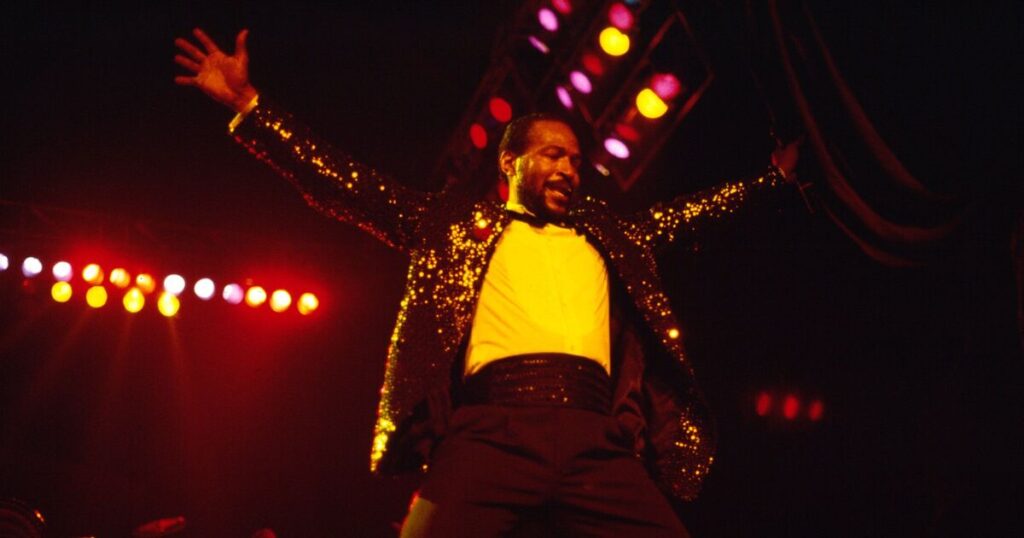

Marvin Gaye’s What’s Going On was picked by Rolling Stone as the best album ever made (Image: Getty)
Every so often, a list comes along that makes people argue – but also makes people listen and open their eyes to undiscovered opinions.
When Rolling Stone updated their definitive list of the 500 Greatest Albums of All Time, the top spot didn’t go to Sgt. Pepper, Thriller, The Dark Side of the Moon or Abbey Road.
Instead, they gave it to What’s Going On – Marvin Gaye’s 1971 concept album about war, injustice, addiction, inequality and the state of the planet.
So I sat down and listened to it from beginning to end – and now I understand why it sits at number one. Here’s what was special about each song:
What’s Going On
It begins not with music, but with voices. We hear people chatting, greeting each other, and it sounds like you’ve walked into a street corner or family gathering – calm, human and real.
Then that saxophone riff fades in, then the congas, and finally, Marvin’s voice: “Mother, mother… there’s too many of you crying.”
Inspired by footage of police brutality during a protest in California, the song manages to sound peaceful while asking furious questions: “Who are they to judge us, simply ‘cause our hair is long?”
It’s warm, beautiful and heartbreaking.
What’s Happening Brother
This time, Marvin sings from the point of view of a returning Vietnam vet – a voice shaped by his brother Frankie’s own stories after coming back from war: “Can’t find no work, can’t find no job, my friend.”
There’s a lightness to the music – a soft groove, the kind of melody you might hum on the street – but underneath it is something more unsettled.
In this, we hear the point of view of someone who’s not angry, but disoriented, trying to slot back into a world that’s already moved on.
Don’t miss… Mick Jagger disowned these Rolling Stones tracks – even one he wrote himself [LATEST]
Flyin’ High (In the Friendly Sky)
Flyin’ High is one of the most fragile moments on the album. Marvin’s voice slips into falsetto, and suddenly he sounds smaller.
He’s singing about addiction, but not in dramatic terms. It’s more like an inner monologue, turning over the same thoughts again and again: “I know I’m hooked, my friend.”
The escape isn’t working, and everything in the arrangement – the floating harmonies, the soft keyboard, the lack of rhythm – mirrors that sense of drifting. It’s the sound of someone barely keeping it together.
Save the Children
This one starts almost mid-thought, like Marvin’s been having a conversation you’ve just dropped in on. He asks a question straight out: “Who really cares to save a world in despair?”
He switches between speaking and singing, and this surprisingly keeps it human – and doesn’t make it sound like a speech or a sermon.
“Save the babies” returns again and again, looping. It’s the kind of song that could have gone big – with a gospel choir or dramatic strings, for example – but Gaye keeps it close.
God Is Love
‘God Is Love’ is just over a minute long, and could pass as a throwaway gospel track if you weren’t paying attention. The lyrics are stripped-back. “Love your mother, she bore you…” There’s no production tricks here, or grandiose twists: just organ, backing vocals and Marvin sounding like someone reminding himself of the basics.
Mercy Mercy Me (The Ecology)
One of the most well-known tracks on the record, and still one of the best. But in context, it changes.
‘Mercy Mercy Me’ is a song about environmental destruction – pollution, oil spills, radiation – way ahead of its time. And somehow Marvin wraps all of it in one of the softest, most inviting grooves he ever recorded.
This was 1971, long before climate crisis became a mainstream talking point, and Marvin was already singing about it like he was foreshadowing what we are now living through.
Right On
This is the longest track on the album, and one of the most fluid for the way it doesn’t follow a traditional structure.
‘Right On’ is part jazz, part spoken essay, part late-night conversation, and Marvin doesn’t push the message on this one.
“Some of us were born with money to spend / Some of us were born for races to win” feels way more like an observation than a statement or complaint.
The rhythm section stays busy – bongo drums, soft electric piano, that ever-present bass – but the energy always simmers without peaks.
Wholy Holy
After the sprawl of ‘Right On’, this one feels deliberately different. It’s spiritual in tone, but not tied to religion and again, there’s no grand choir or cinematic build, just slow organ chords and Marvin’s voice.
“We can conquer hate forever” sounds almost like someone trying to hold onto that belief, even while everything around him says otherwise.
This track doesn’t try to convert or plead, but feels like a quiet reminder of what Marvin felt might still be possible in a peaceful society.
Inner City Blues (Make Me Wanna Holler)
The closer is heavier than the album’s previous tracks – the rhythm is tighter and the chords are darker, and critics said Marvin sounds fed up.
“Rockets, moon shots / Spend it on the have-nots…” he makes a list of frustrations and calls out the ones responsible for them.
And just when it feels like it’s winding down, the music circles back to that now-familiar refrain from What’s Going On.
The album ends the way it began – as if the conversation is still happening. And it feels just as powerful now, five decades later.
At the time, Motown founder Berry Gordy didn’t want to release it, thinking the protest themes were too risky, but Marvin Gaye pushed back. And when the title track became a hit, Gordy gave him just 30 days to turn it into a full album.
After What’s Going On, Black artists at Motown had more freedom to speak politically and creatively. You can hear echoes of it today in everyone from Kendrick Lamar to D’Angelo to Sampha.
 Latest World Breaking News Online News Portal
Latest World Breaking News Online News Portal






